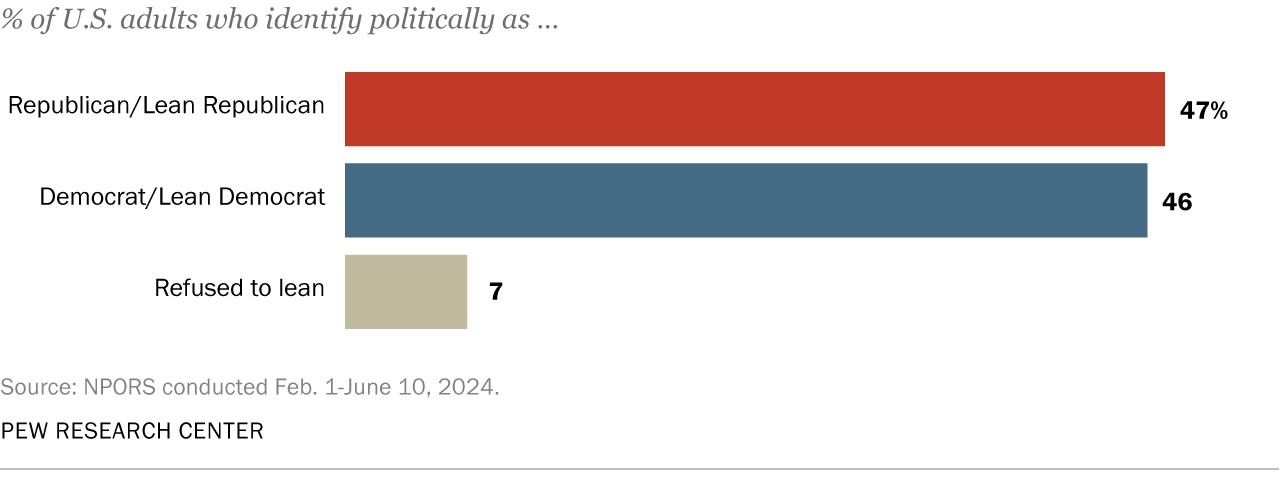


Nate Cohn
@Nate_Cohn
Perhaps the most important poll you've never heard of came out today: the Pew NPORS study, a large mail survey with financial incentives and a 30% response rate. It's important enough that I had to open it when the email arrived.
Historically, Democrats have always had an edge on Republicans as far as party identification.
But a very large survey from Pew now shows Republicans with a +1 party identification edge.
Meanwhile, an Emmerson poll says that Trump beats every possible Democrat replacement candidate.
David Strom:
The poll, taken over the past two days, is a high-water mark for Trump showing him close to breaking the 50% mark in most matchups, although it is interesting to see that Biden and Harris do the best against Trump and are at equal support, although Trump actually does the best against Harris.
That actually says quite a bit about how unpopular Kamala Harris is. She is no more popular than a man widely acknowledged as a vegetable. Whitmer and Shapiro can at least claim that their name ID is low, explaining their worse numbers against Trump. If you think Biden is being humiliated in public by staying in the race, Kamala's humiliation is x2.
Obviously this is a good poll, and not just for the main reason. It's a great result not just because it predicts a Trump win, no matter who the opponent, but because it buttresses Biden's main argument for remaining in the race: I'm the best one to take on Trump. And even if he's not actually "the best" to take on Trump, no one can argue that they would beat Trump, either.
So why change horses midstream and etc.?
Unless some possible replacement candidate shows that he consistently polls ahead of Trump, Biden will dig in his heels, justifiably, and say "No one is beating Trump right now, all of us would need a break or October Surprise to beat him, so why shouldn't I be the candidate waiting for that October Surprise instead of Gretchen Whitmer?"
On the other hand, the polls are becoming increasingly bleak for Biden. The Cook Political Report just shifted six states to the GOP's column.
The states affected by this shift--Arizona, Georgia, Michigan, Pennsylvania, Wisconsin, and Nevada--are crucial battlegrounds that could determine the next occupant of the White House. Each of these states showed a marked movement towards the Republican Party, attributed largely to Biden's perceived debate disaster.
In the aftermath of the debate, voters in these states have expressed growing concerns over Biden's ability to effectively lead, further amplified by ongoing issues such as economic instability and rising crime rates. These factors, combined with a lackluster debate performance, have contributed to a waning confidence in Biden among swing voters and independents.
The electoral implications of this shift are significant. For Republicans, gaining traction in these states could pave the way for a stronger path to victory in the 2024 election. Conversely, for Democrats, the shift underscores the urgent need to address the concerns of voters and reassess campaign strategies to regain lost ground.
New York state has become competitive -- a real horrorshow for the Democrats. Biden won New York in 2020 by twenty-two points, 56% to Trump's 34%.
And now? Biden leads by an average of 7.5%.
That's still a pretty solid lead for Biden, but that is a lead that could be overcome, particularly if Biden continues losing support generally, and if Democrat voters then become discouraged and vote at a lower propensity.
President Joe Biden is witnessing a notable decline in support from New York voters, traditionally a reliable Democratic base. According to recent polls, Biden's approval ratings have taken a sharp downturn, raising concerns among Democratic strategists about the state's political future.
Key among the factors contributing to this shift is growing dissatisfaction among both Democratic and Independent voters. Issues such as inflation, crime rates, and economic policies have led to increasing criticism of Biden's administration. This changing sentiment suggests that New York, once considered a safe haven for Democrats, may now emerge as a critical battleground state in the upcoming 2024 election.
"We're still acting like this is a one-party state, which for pretty much 20, 25 years it has been," Democratic Manhattan Borough President Mark Levine said. "I truly believe we're a battleground state now."
Trump will make a big play for New York both to depress Democrat turnout in other states -- if New York is in play, then the election is over, and you might as well not vote, and you might as well not cast fraudulent votes either -- and also because it would really please his ego to win his home state.
